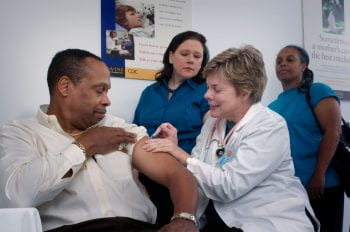SARS-CoV-2 (COVID-19) resulted in school closures and contingencies across the U.S. that limited access to school meals for students. While some schools attempted to provide alternative meal access points where students or parents could pick up meals, many students—especially those in low-income households—lacked adequate transportation to these access points. Thus, physical proximity to meal access […]
Category: Health
Vaccine hesitance during COVID-19
As rates of vaccination have slowed, concerns are growing about how to increase vaccine uptake among those who are vaccine hesitant, particularly with the emergence of new and contagious variants such as Delta. Using our national Socioeconomic Impacts of COVID-19 Survey, we examine the predictors of vaccine hesitance in the U.S. and report on findings […]
Public perceptions and the willingness to get vaccinated against COVID-19: Lessons from Israel

Abstract Objectives To explore the associations between vaccine hesitancy and demographic and socio-economic characteristics, as well as perspective towards the COVID-19 and its vaccines. Methods Data were collected through four online surveys on Israel’s representative sample in March (3/2 to 3/7, n = 1517), August (8/10–8/11, n = 925; 8/18–8/22, n = 1054), and September (9/22-9/24; n=1406), 2021. We employ a […]
Public perceptions and the willingness to get vaccinated against COVID-19: Lessons from Israel

Abstract Objectives To explore the associations between vaccine hesitancy and demographic and socio-economic characteristics, as well as perspective towards the COVID-19 and its vaccines. Methods Data were collected through four online surveys on Israel’s representative sample in March (3/2 to 3/7, n = 1517), August (8/10–8/11, n = 925; 8/18–8/22, n = 1054), and September (9/22-9/24; n=1406), 2021. We employ a […]
COVID-19 job and income loss and mental health: the mediating roles of financial assets and well-being and the moderating role of race/ethnicity

Abstract Prior research shows unemployment has a negative effect on mental health, yet whether this relationship is affected by financial factors is unknown. For example, having money in savings may mitigate the impact of job loss on mental health. We use structural equation modeling with data from the Socio-Economic Impacts of COVID-19 Survey with a […]
Does a food insecurity intervention improve perinatal outcomes for mother and child? A randomized control study protocol of the Fresh Rx: Nourishing Healthy Starts program

Abstract Pregnancy and postpartum periods represent critical times to support nutrition and household food security, especially for families with limited or strained economic resources. The Fresh Rx: Nourishing Healthy Starts study uses a randomized design to examine a comprehensive, holistic “food is medicine” program targeting food insecure expectant mothers in an area with high rates […]
At Home and on the Brink: U.S. Parents’ Mental Health during COVID-19

Abstract Though the COVID-19 pandemic required significant changes and adaptations for most Americans, parents faced acute challenges as they had to navigate rapidly changing schooling and child care policies requiring their children to spend more time at home. This study examines the effects of COVID-19 school and workplace policies as well as environmental and economic […]
Usage and Impact of Benefits Among Frontline Healthcare Workers

Summary We completed a study about frontline healthcare workers – the benefits they get through work and how they are doing financially. This brief provides highlights from our survey to 2,321 workers and interviews with 30 workers.
Combatting Rising Healthcare Costs for Healthier Adults

Summary In 2020, healthcare expenditures averaged $12,530 per person, up 9.7% from 2019. In 2018, 19% of U.S. households had medical debt with $2,000 being the median amount owed. Over half of adults between 18 to 64 years of age are estimated to experience some form of medical financial hardship including medical bills or debt, […]
All over the Map: A Systematic Literature Review and State Policy Scan of Medicaid Buy-In Programs for Working Individuals with Disabilities

Abstract While supports for people with disabilities have increased, significant healthcare and financial barriers persist. State-administered Medicaid Buy-In programs for working people with disabilities, distinct from broader buy-in discussions that have emerged as some states consider expanding access to health insurance, are intended to incentivize employment and protect against a loss of Long-Term Services and […]
Prevalence of Long-COVID Among Low-Income and Marginalized Groups: Evidence From Israel

Abstract Objective: To identify the socioeconomic and demographic factors associated with the prevalence of self-reported long-COVID symptoms. Method: We examined the association between acute-COVID (SARS-CoV-2) and long-COVID symptoms, by a cross-sectional analysis of data obtained on a prospective online-survey, conducted from November to December 2021 on a nationally-representative sample of the Israeli population (N = 2,246). Results: Findings […]
Male Caregivers and Engagement in a Family Strengthening Program for Child Disruptive Behavior Disorders

Abstract Awareness and interest in involving male caregivers in child mental health treatment has grown, especially for youth with disruptive behavior disorders like oppositional defiant disorder (ODD). The purpose of this study was to examine the relationship between male caregiver involvement and treatment engagement for child ODD. Children (n = 122) ages 7–11 and their caregivers participated […]
Implementation of Flexibilities to the National School Lunch and Breakfast Programs and Their Impact on Schools in Missouri

Abstract Background: In 2018, the United States Department of Agriculture (USDA) issued flexibilities to the National School Lunch and Breakfast Programs, relaxing the nutrition standards for milk, whole grains, and sodium. This study examines the implementation decision-making among Missouri school food services and the impact of implementing these flexibilities on the meals served. Methods: We […]
COVID-19 Safety Concerns, School Governance Models, and Instructional Modes: An Exploration of School Quality Perspectives during the Pandemic

Abstract This paper explores how parents’ COVID-19 safety concerns relate to school governance models (SGMs), instructional modes (i.e. in-person, hybrid, online), and perceptions of school quality during the pandemic. Leveraging two waves of household survey data across 47 states and the District of Columbia, we first conduct a series of multinomial regression analyses to explore […]
Coping with COVID-19: Differences in hope, resilience, and mental well-being across U.S. racial groups

Abstract Objectives To explore if the COVID-19 pandemic revealed differences across racial groups in coping, resilience, and optimism, all of which have implications for health and mental well-being. Methods We collect data obtained from four rounds of a national sample of 5,000 US survey respondents in each round from April 2020 to February 2021. Using […]
COVID-19-Related Fear among Youth in Israel

Abstract The present study sought to expand the now expansive research on COVID-19 by examining COVID-19-related fear among adolescents in Israel, focusing on demographic variables, COVID-19-related variables (e.g., exposure and vaccination), psychosocial variables (e.g., adolescent wellbeing and perceived social support), and technology usage (e.g., amount of time spent on social media). Data from parents were […]
Connecting the Dots between Barriers to W.I.C. Access and Adult and Child Food Insecurity: A Survey of Missouri Residents

Abstract Background. Previous research has explored the impact of W.I.C. on recipients’ health, but less is known about the connection between barriers to W.I.C. access and health outcomes. We fill in a gap in the literature by studying the relationship between barriers to Special Supplemental Nutrition Program for Women, Infants, and Children (W.I.C.) access and adult […]
Municipal officials’ perspectives on policymaking for addressing obesity and health equity

Abstract Background: Obesity evidence-based policies (EBPs) can make a lasting, positive impact on community health; however, policy development and enactment is complex and dependent on multiple forces. Aims and objectives: This study investigated key factors affecting municipal officials’ policymaking for obesity and related health disparities. Methods: Semi-structured interviews were conducted with 20 local officials from […]
It shouldn’t take a pandemic to increase school meal access for low-income students: A two-step floating catchment area analysis of school meal access during COVID-19
COVID-19 created an additional barrier for students who benefit from free school meals. While some schools attempted to provide alternative meal access points, many students lack adequate transportation. This study examines meal access in St. Louis, MO.
Coping with COVID-19: Implications of Differences in Resilience across Racial Groups for Mental Health and Well-being
Data obtained from the Socioeconomic Impacts of COVID-19 Survey indicate that, despite extreme income and health disparities before and during the COVID-19 outbreak, Black and Hispanic people remain more resilient and optimistic than their white counterparts.
Improving the Take-Up of Homecare Services Among Holocaust Survivors in a Jewish Charitable Organization
This research brief is part of a series by the Social Impact Nudgeathon initiative. This initiative incorporated insights from behavioral economics into the design and delivery of social welfare programs. Developed through a partnership between the Joint Distribution Committee in Israel (JDC-Israel) and the Social Policy Institute (SPI) at Washington University in St. Louis, this initiative is among the first of its kind to launch in Israel. […]